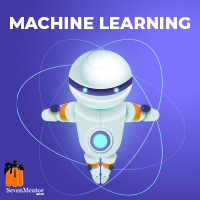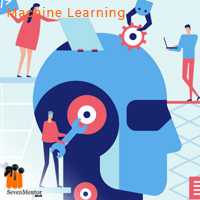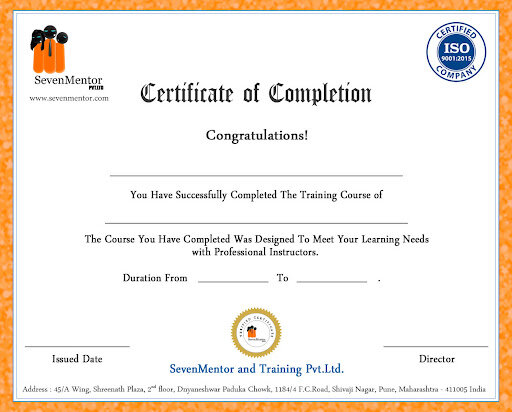Machine Learning
A day less work from humans and more from machines. Machine learning courses in Vapi are being used in portals, email filters to weed out spam, websites to provide personalised recommendations, banking software to detect suspicious transactions, and many apps on mobile phones, such as voice recognition.
Call The Trainer
Batch Timing
- Regular: 2 Batches
- Weekends: 2 Batches
Request Call Back
Class Room & Online Training Quotation
About Machine Learning
The technique has many more possible uses, some with higher stakes than others. Future developments may benefit the UK economy and have a huge impact on society. For example, machine learning training in Vapi could provide us with readily available 'personal assistants' to help manage our lives, it could dramatically improve the transportation system through the use of autonomous vehicles, and it could dramatically improve the healthcare system by improving disease diagnosis or personalizing treatment. Machine learning classes in Vapi could also be utilized in security applications, such as analyzing email messages or internet usage.
What is the distinction between the deep learning and machine learning course in Vapi?
Machine learning training in Vapi refers to computers learning from data and utilizing algorithms to execute a task that has not been explicitly programmed. Deep learning employs a complicated set of algorithms based on the human brain. This allows unstructured data such as documents, photos, and text to be processed.
The fundamental importance between machine learning classes in Vapi and deep learning
This is a popular question, and if you've read this far, you're undoubtedly aware that it shouldn't be addressed in this manner. Machine learning courses in Vapi algorithms is deep learning algorithms. As a result, it might be helpful to consider what distinguishes deep learning within the subject of machine learning. The answer is the ANN algorithm structure, which requires less human interaction and requires more data. To begin with, unlike typical machine learning methods, such as linear regression or decision trees, deep learning is built on an artificial neural network. This multi-layered ANN is intricate and interwoven, much like a human brain.
Definition of machine learning
Machine learning is a subfield of artificial intelligence that contains methods, or algorithms, for constructing models automatically from data. A machine learning system learns by experience, as opposed to a system that executes a task by following explicit rules. Whereas a rule-based system will do the same task (for better or worse) every time, the performance of a machine learning system can be enhanced through training by exposing the algorithm to more data. Machine learning methods are frequently classified as supervised (the training data is labeled with the answers) or unsupervised (any labels that may exist are not shown to the training algorithm).
Machine learning applications
Daily, we hear about machine learning applications, yet not all of them are unqualified successes. Self-driving automobiles are an excellent example, with jobs ranging from basic and successful (parking assistance and highway lane following) to complex and risky (full vehicle control in urban settings, which has led to several deaths). Game-playing machine learning has outperformed human world champions in checkers, chess, shogi, and Go. Although some language pairs perform better than others, and many automatic translations can yet be improved by human translators, automatic language translation has proven mainly effective. Automatic speech to text works reasonably well for persons with mainstream accents, but not so well for people with strong regional or national accents; performance is dependent on the vendors' training sets. Automatic sentiment analysis of social media has a reasonable success rate, owing to huge and easily accessible training sets (e.g., Amazon product ratings, which pair a comment with a numerical score).
The automatic screening of resumes is a contentious topic. Amazon had to remove its internal system due to training sample biases, which caused it to degrade all-female job applications.
Algorithms for machine learning
Machine learning relies on a variety of techniques to convert a data set into a model. The optimum algorithm relies on the type of problem being solved, the computational resources available, and the nature of the data. Whatever technique or algorithms you select, you must first clean and condition the data.
How to Make Use of Machine Learning
How does one create a machine learning model? You begin by cleaning and conditioning the data, then move on to feature engineering and finally attempt every machine-learning method that makes sense. Deep learning methods are likely to work for specific types of problems, such as vision and natural language processing.
Cleaning data for machine learning
There is no such thing.
Machine learning data encoding and normalizing
To use categorical data for machine classification, the text labels must be encoded into another format. There are two types of encodings.
One method is label encoding, which replaces each text label value with a number. The other method is one-hot encoding, which converts each text label value into a column with a binary value (1 or 0). Most machine learning frameworks have methods that convert data for you. In general, one-shot encoding is desirable since label encoding can occasionally trick the machine learning system into thinking the encoded column is sorted.
Machine learning feature engineering
A feature is an individual measurable quality or characteristic of observed phenomena. A "feature" is similar to an explanatory variable, which is employed in statistical techniques such as linear regression. Feature vectors are numerical vectors that combine all of the features for a particular row. Choosing a minimum set of independent variables that describe the situation is part of the art of feature selection. If two variables are highly connected, they should either be consolidated into a single feature or deleted. The principal component analysis is sometimes used to turn correlated data into a set of linearly uncorrelated variables.
Data segmentation for machine learning
For supervised machine learning, it is common practice to divide the data set into subsets for training, validation, and testing. One method is to assign 80% of the data to the training data set and 10% to each of the validation and test data set. (The precise divide is a matter of personal preference.) The training data set is used for the majority of the training, while the validation data set is used for prediction at the end of each epoch. The validation data set's errors might be utilised to determine halting criteria or to drive hyperparameter tweaking. Most importantly, the mistakes in the validation data set might assist you in determining whether the model has overfitted the data.
Online Classes
Essential and technology niches can be effective in the case of freshers. SevenMentor & Training Pvt. Ltd.. is an institute where there are plenty of technical topics held for training. Our training consists of elaborate classes and training. Every concept is considered and practical labs are conducted, for thorough learning. Tests are held for effective skill examinations. Class schedules are as per your needs. Our placement cell offers multiple opportunities for any candidate that assures your career success. Online Machine Learning course in Vapi is a trending concept in the new era of technology. As explained, we monitor the classes and you are specialized with the courses you prefer.
Course Eligibility
- Candidates Who Want to be a Data Scientist, Big Data Analysists, Analytics Manager/Professionals, Business Analyst, Developer
- Graduates who are looking to create a career in Data Science and Machine Learning
- Employees – Organization is getting to shift to Big data tools
- Mid-level Executives
- Managers with knowledge of basic programming
Syllabus of Machine Learning
- 1 Data Science>
- Introduction to Data Science
- Need for Business Analytics
- Data Science Life Cycle
- Different tools available for Data Science
- Pre-requisites of Data Science
- 2 R-Programming
- Introduction to R
- Installation of R
- Windows Installation
- Linux Installation
- Installation of R-Studio
- 2.1 Types of Variables
- Types of Operators
- Arithmetic Operators
- Logical Operators
- Relational Operators
- Membership Operators
- Special Operators
- If-else Flow Control
- Loops in R (While, For, Break, Next)
- Switch-Case
- 2.2 Types of Datatype
- Vectors
- Arrays
- List
- Matrices
- Factors
- Data Frames
- 2.3 Types of Loops
- For loop
- While Loop
- Nested Loops
- 2.4 Functions in R
- Function declaration with parameters
- Function declaration without parameters
- 2.5 R Data Interface
- Reading CSV files
- Reading XML files
- JSON files
- Scraping data from the Web
- SQL with R
- Databases with R
- 2.6 Data Visualization of R
- Pie Chart
- Bar graph
- Line Graph
- Scatter plot
- Stack Plot
- Box-Plot
- 2.7 Statistics in R
- Terminologies of Statistics
- Normal Distribution
- Binomial Distribution
- Regression Analysis
- Poisson Distribution
- Time-Series Analysis
- Chi-square Test Analysis
- Non-linear square analysis
- 2.8 Machine Learning in R
- What is Machine Learning ?
- Supervised Machine learning
- Unsupervised Machine learning
- Application of Machine Learning.
- AI vs Machine Learning
- Supervised Learning
- Classification algorithms
- Decision Tree
- Random Forest
- Naive-Bayes
- SVM Classifier
- Regression Learning
- Linear Regression
- Multiple Regression
- Logistic Regression
- Clustering
- K-means clustering
- K-nearest neighbour
- 2.7 Statistics in R
Trainer Profile of Machine Learning
Our Trainers explains concepts in very basic and easy to understand language, so the students can learn in a very effective way. We provide students, complete freedom to explore the subject. We teach you concepts based on real-time examples. Our trainers help the candidates in completing their projects and even prepare them for interview questions and answers. Candidates can learn in our one to one coaching sessions and are free to ask any questions at any time.
- Certified Professionals with more than 8+ Years of Experience
- Trained more than 2000+ students in a year
- Strong Theoretical & Practical Knowledge in their domains
- Expert level Subject Knowledge and fully up-to-date on real-world industry applications
Machine Learning Exams & Certification
SevenMentor Certification is Accredited by all major Global Companies around the world. We provide after completion of the theoretical and practical sessions to fresher’s as well as corporate trainees.
Our certification at SevenMentor is accredited worldwide. It increases the value of your resume and you can attain leading job posts with the help of this certification in leading MNC’s of the world. The certification is only provided after successful completion of our training and practical based projects.
Proficiency After Training
- Expert in Machine learning, data analysis
- Able to work on statistical concepts using python or R
- Able to work with AI
- Have a good understanding of Data Science Algorithms
- Able to work on real-time projects with R studio
- Analyze several types of data using R
- Learn tools and techniques for Data Transformation
- Gain insights from Data and Visualize it
- Work with different file formats and types of data.
Key Features
Skill level
From Beginner to Expert
We are providing Training to the needs from Beginners level to Experts level.
Course Duration
12 weeks
Course will be 90 hrs to 110 hrs duration with real-time projects and covers both teaching and practical sessions.
Total Learners
2000+ Learners
We have trained more than 2000 aspirants.
Frequently Asked Questions
Batch Schedule
| DATE | COURSE | TRAINING TYPE | BATCH | CITY | REGISTER |
|---|---|---|---|---|---|
| 17/03/2025 |
Machine Learning |
Online | Regular Batch (Mon-Sat) | Vapi | Book Now |
| 18/03/2025 |
Machine Learning |
Online | Regular Batch (Mon-Sat) | Vapi | Book Now |
| 15/03/2025 |
Machine Learning |
Online | Weekend Batch (Sat-Sun) | Vapi | Book Now |
| 15/03/2025 |
Machine Learning |
Online | Weekend Batch (Sat-Sun) | Vapi | Book Now |
Students Reviews
The training here is beneficial. Seven Mentor & Training Pvt. Ltd. is a well-known organisation. Many technologies are covered here.
- Nilesh Ghodke
The teachers, in my opinion, were incredibly knowledgable about their field. I'm eager to learn more from this training facility. The classroom was both peaceful and lively.
- Nishant Kotwal
The staff was quite kind. It is critical for me to continue studying and expanding my knowledge. The most popular features have been determined. Everything was wonderful. The schedule went as expected.
- Upen Patel
Course video & Images



Corporate Training
Taking studies at a reputed institute provides graduates with numerous professional prospects. The corporate Machine Learning course in Vapi is one of the vital courses offered by SevenMentor & Training Pvt. Ltd. It offers a variety of technological concepts. Our trainers will motivate and train you properly in the courses that you have signed for. The schedules here are well-organized, and the classes look good. Every person's career level is prioritised, and we assist candidates in overcoming any obstacles that may arise. We value everyone's dreams and strive to help them succeed.
Our Placement Process

Eligibility Criteria

Placements Training

Interview Q & A

Resume Preparation

Aptitude Test

Mock Interviews

Scheduling Interviews

Job Placement

Related Courses
Have a look at all our related courses to learn from any location
In Python, there is a comprehensive environment that facilitates the performance of statistical operations as well as the generation of data analysis in graphical or text format.
Data Analysis where dealing with unstructured and structured data, Data Science is a field that encompasses anything related to data cleansing, preparation, and analysis. Put simply, Data Science is an...
Request For Call Back
Class Room & Online Training Quotation

